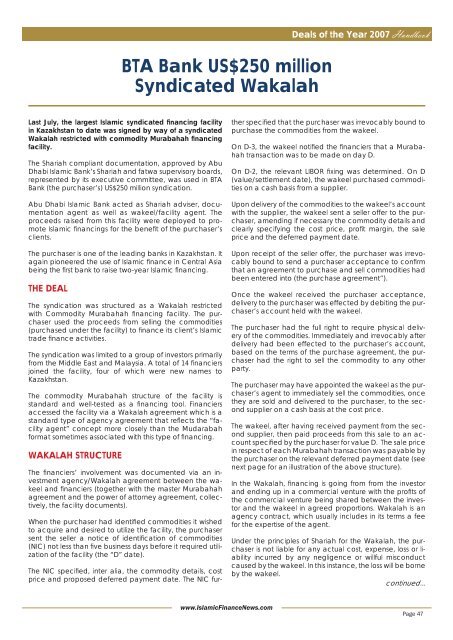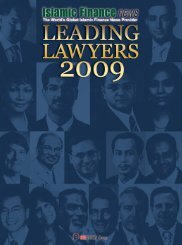RAKIA Sukuk (continued...) - Islamic Finance News
RAKIA Sukuk (continued...) - Islamic Finance News
RAKIA Sukuk (continued...) - Islamic Finance News
You also want an ePaper? Increase the reach of your titles
YUMPU automatically turns print PDFs into web optimized ePapers that Google loves.
BTA Bank US$250 million<br />
Syndicated Wakalah<br />
Deals of the Year 2007 Handbook<br />
Last July, the largest <strong>Islamic</strong> syndicated financing facility<br />
in Kazakhstan to date was signed by way of a syndicated<br />
Wakalah restricted with commodity Murabahah financing<br />
facility.<br />
The Shariah compliant documentation, approved by Abu<br />
Dhabi <strong>Islamic</strong> Bank’s Shariah and fatwa supervisory boards,<br />
represented by its executive committee, was used in BTA<br />
Bank (the purchaser’s) US$250 million syndication.<br />
Abu Dhabi <strong>Islamic</strong> Bank acted as Shariah adviser, documentation<br />
agent as well as wakeel/facility agent. The<br />
proceeds raised from this facility were deployed to promote<br />
<strong>Islamic</strong> fi nancings for the benefi t of the purchaser’s<br />
clients.<br />
The purchaser is one of the leading banks in Kazakhstan. It<br />
again pioneered the use of <strong>Islamic</strong> fi nance in Central Asia<br />
being the fi rst bank to raise two-year <strong>Islamic</strong> fi nancing.<br />
THE DEAL<br />
The syndication was structured as a Wakalah restricted<br />
with Commodity Murabahah fi nancing facility. The purchaser<br />
used the proceeds from selling the commodities<br />
(purchased under the facility) to fi nance its client’s <strong>Islamic</strong><br />
trade fi nance activities.<br />
The syndication was limited to a group of investors primarily<br />
from the Middle East and Malaysia. A total of 14 fi nanciers<br />
joined the facility, four of which were new names to<br />
Kazakhstan.<br />
The commodity Murabahah structure of the facility is<br />
standard and well-tested as a fi nancing tool. Financiers<br />
accessed the facility via a Wakalah agreement which is a<br />
standard type of agency agreement that refl ects the “facility<br />
agent” concept more closely than the Mudarabah<br />
format sometimes associated with this type of fi nancing.<br />
WAKALAH STRUCTURE<br />
The fi nanciers’ involvement was documented via an investment<br />
agency/Wakalah agreement between the wakeel<br />
and fi nanciers (together with the master Murabahah<br />
agreement and the power of attorney agreement, collectively,<br />
the facility documents).<br />
When the purchaser had identifi ed commodities it wished<br />
to acquire and desired to utilize the facility, the purchaser<br />
sent the seller a notice of identifi cation of commodities<br />
(NIC) not less than fi ve business days before it required utilization<br />
of the facility (the “D” date).<br />
The NIC specifi ed, inter alia, the commodity details, cost<br />
price and proposed deferred payment date. The NIC further<br />
specifi ed that the purchaser was irrevocably bound to<br />
purchase the commodities from the wakeel.<br />
On D-3, the wakeel notifi ed the fi nanciers that a Murabahah<br />
transaction was to be made on day D.<br />
On D-2, the relevant LIBOR fi xing was determined. On D<br />
(value/settlement date), the wakeel purchased commodities<br />
on a cash basis from a supplier.<br />
Upon delivery of the commodities to the wakeel’s account<br />
with the supplier, the wakeel sent a seller offer to the purchaser,<br />
amending if necessary the commodity details and<br />
clearly specifying the cost price, profi t margin, the sale<br />
price and the deferred payment date.<br />
Upon receipt of the seller offer, the purchaser was irrevocably<br />
bound to send a purchaser acceptance to confi rm<br />
that an agreement to purchase and sell commodities had<br />
been entered into (the purchase agreement”).<br />
Once the wakeel received the purchaser acceptance,<br />
delivery to the purchaser was effected by debiting the purchaser’s<br />
account held with the wakeel.<br />
The purchaser had the full right to require physical delivery<br />
of the commodities. Immediately and irrevocably after<br />
delivery had been effected to the purchaser’s account,<br />
based on the terms of the purchase agreement, the purchaser<br />
had the right to sell the commodity to any other<br />
party.<br />
The purchaser may have appointed the wakeel as the purchaser’s<br />
agent to immediately sell the commodities, once<br />
they are sold and delivered to the purchaser, to the second<br />
supplier on a cash basis at the cost price.<br />
The wakeel, after having received payment from the second<br />
supplier, then paid proceeds from this sale to an account<br />
specifi ed by the purchaser for value D. The sale price<br />
in respect of each Murabahah transaction was payable by<br />
the purchaser on the relevant deferred payment date (see<br />
next page for an illustration of the above structure).<br />
In the Wakalah, fi nancing is going from from the investor<br />
and ending up in a commercial venture with the profi ts of<br />
the commercial venture being shared between the investor<br />
and the wakeel in agreed proportions. Wakalah is an<br />
agency contract, which usually includes in its terms a fee<br />
for the expertise of the agent.<br />
Under the principles of Shariah for the Wakalah, the purchaser<br />
is not liable for any actual cost, expense, loss or liability<br />
incurred by any negligence or willful misconduct<br />
caused by the wakeel. In this instance, the loss will be borne<br />
by the wakeel.<br />
<strong>continued</strong>...<br />
www.<strong>Islamic</strong><strong>Finance</strong><strong>News</strong>.com<br />
Page 47
















